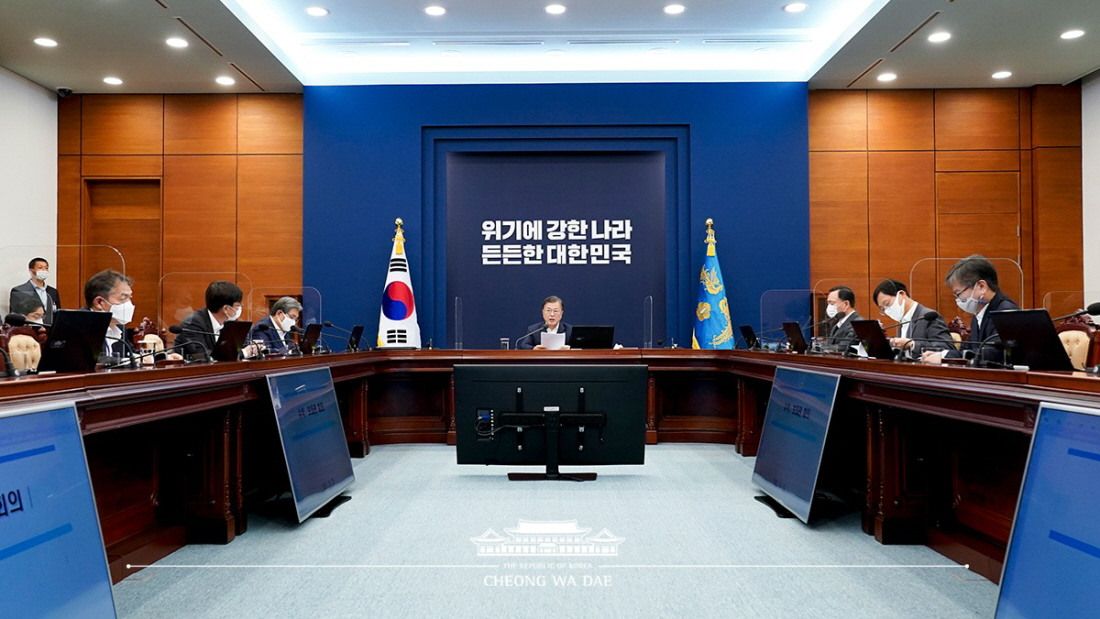이 웹사이트는 제19대 대통령 임기 종료에 따라 대통령기록관이 「대통령기록물 관리에 관한 법률」에 의해 이관받아 서비스하는 대통령기록물입니다. 자료의 열람만 가능하며 수정 · 추가 · 삭제는 불가능합니다.
다만, 「개인정보보호법」에 의하여 개인의 정보를 보호받기 원하시는 분은 관련 내용(요청자, 요청내용, 연락처, 글위치)을 대통령 웹기록물 담당자(044-211-2253)에게 요청해 주시면 신속히 검토하여 조치해 드리겠습니다. 감사합니다.
SPEECHES & REMARKS
BRIEFINGS
Opening Remarks by President Moon Jae-in at Meeting with His Senior Secretaries

With the worldwide daily caseload nearing 500,000 and a potential second wave of the COVID-19 pandemic escalating the crisis, Europe and many parts of the world are tightening their emergency measures, including the reimposition of lockdowns. By contrast, we have become a special and exceptional country that has eased epidemic prevention and control restrictions.
However, we should never fall into complacency or let our guard down. We must be able to prevent the spread of COVID-19 successfully even with eased restrictions if these downgraded measures are to last. At a minimum, I urge everyone to comply with epidemic prevention guidelines without fail even as they gradually resume once greatly constrained daily routines, go out and enjoy the colorful autumn leaves and carry on vibrant economic activities.
Through these downgraded epidemic prevention measures, the Government has minimized compulsory restrictions, such as bans on gatherings, but has further stepped up the epidemic control measures that precisely target high-risk facilities, thereby actively curbing and controlling the spread of COVID-19. Despite recent spikes in the number of daily confirmed cases, we are reining in community transmissions as much as possible because they are primarily occurring in some vulnerable facilities.
In particular, it was impossible to determine the source of infection for over 27 percent of patients about a month ago, but the rate has since steadily decreased and has now dropped markedly to about 11 percent. The fact that infections can be tracked swiftly and accurately attests to the effectiveness of our epidemic prevention and control system.
Meanwhile, one reason for the temporary increases in the number of confirmed cases is that we have been conducting complete screenings of all nursing hospitals and facilities to preemptively reinforce those epidemic prevention and control measures that precisely target high-risk facilities.
Such complete screenings will help protect the lives of the vulnerable, those at risk of mass infections with high mortality rates. They constitute preemptive measures to prevent asymptomatic individuals from transmitting COVID-19. This also attests to our epidemic prevention and control system running seamlessly without a breach. Notwithstanding the possible fluctuations in the number of confirmed cases in the future, the Government will remain fully committed to carrying out epidemic prevention management even more thoroughly.
Epidemic prevention measures have eased in tandem with the results of relevant efforts, and it is fortunate that economic activities are being normalized step by step. The gradual increase in consumption is creating an opportunity for a rebound in spending. I look forward to us making the most of this opportunity to facilitate a rapid economic recovery.
The Government is making multifaceted policy efforts to boost domestic demand. Along with the phased-in resumption of voucher distribution, the Government has begun to earnestly implement comprehensive measures to bolster domestic demand – in regard to consumption, dining, tourism, performances, exhibitions and culture. I would be grateful to our people if they could join our efforts to stimulate consumption.
However, we should be mindful that boosting consumption must be pursued under the premise that Level 1 social distancing is strictly followed.
Meanwhile, concerning the flu vaccines, I hope the people will trust the conclusions and announcements made by health authorities after consultations with experts. Autopsies and other examinations of reported cases so far and judgments based on all available data have confirmed the fact that there is no direct causal relationship between the vaccinations and deaths.
To prevent not only the flu but also the simultaneous infection and spread of COVID-19 and the flu this year, we need to further increase the number of flu vaccinations. I hope that excessive anxiety does not cause people to lose this opportunity for a timely vaccination and run the greater risk of catching a highly fatal flu.
I ask healthcare authorities to do whatever they can to prevent people from having undue anxiety. For that purpose, they should not only quickly examine the reported deaths and transparently disclose the results but also present the cases of post-vaccination deaths from last year and cases from abroad for comparison.
The 21st National Assembly’s first audit and inspection of the Administration is nearing its end. It is very regrettable that these sessions still remain a venue for political offensives. Even under these circumstances, we will actively embrace reasonable criticisms and reflect suggestions in government policies regardless of whether they came from the ruling or opposition parties.
During the audit and inspection, a consensus formed on the need to institutionalize support for the contract-based self-employed, including couriers, platform workers and freelancers. This was the most important outcome. Moreover, we will actively accommodate the detailed suggestions concerning safety in everyday life by expanding the number of designated school zones; establishing more child protection agencies; and making regulations for electric scooters, whose use has caused a recent sharp rise in accidents. We will also seriously consider the suggestion that systematic support is needed for those businesses that employ smart factory systems.
I find the following suggestion very helpful: real estate-related public statistics – the basis for real estate policies – should be strengthened by using statistics drawn from actual transaction prices that accurately reflect real estate deals. I ask the Government to devise necessary measures by actively taking into account the reasonable criticisms and suggestions presented during the audit and inspection and reflecting them in its policies.



